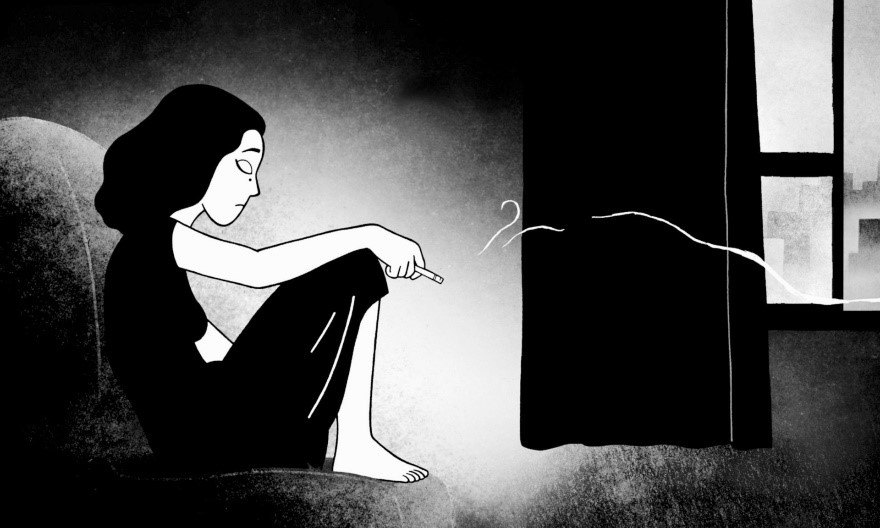The daily inundation of global events through outlets like news programs, the internet, and word of mouth is truly staggering. The myriad of news stories easily available brings with it increased accessibility to knowledge of disturbing events. This begs the question of what negative effects such a large amount of controversial content can have on someone. To explore this notion of an ever-decreasing humanity stemming from the media one consumes, I have assembled a festival of satirical, outlandish, and cynical portrayals of people taking too deep of an interest in the most sensational media. These three stylistically unique, yet thematically unified films are Network (Lumet, 1976), Videodrome (Cronenberg, 1983) and Nightcrawler (Gilroy, 2014). While these films are different in tone and execution, they nevertheless present characters that become desensitized by media that pushes ethical and moral boundaries.
Continue readingMedia Sensationalism and the Loss of Humanity: My Film Festival by Peyton Holland
Ben Werdegar, Author of FM 11.2 (2020) Article “The Forgotten Narrative of Palestine”
Film Matters: Please tell us about your article that is being published in Film Matters.
Ben Werdegar: My article is an analysis of Elia Suleiman’s 2002 film Divine Intervention and the bold statement the film makes about the effects of the Israeli-Palestinian conflict on the people of Palestine. As a filmmaker, Suleiman uses a wide variety of methods to achieve this goal, ranging from the frequent use of stationary shots from a distance, the considerable lack of character dialogue, and mise-en-scene that is frequently loaded with metaphor, just to name a few examples. The film is an act of providing a voice to the voiceless Palestinians by chronicling their struggle and their loss in a somberly artistic fashion.
Continue readingAndrew Lewis, Author of FM 11.2 (2020) Article “Musical Communion in a Post-national World: The Other Side of Hope (2017)”
Film Matters: Please tell us about your article that is being published in Film Matters.
Andrew Lewis: This article describes the use of diegetic music in Aki Kaurismäki’s 2017 film The Other Side of Hope. Portraying how music can make a meaningful connection with individuals facing oppression, the director’s films have always relied on music as a tool for political narration. Dealing with the 2010s refugee crisis in Europe, this film sees the director’s use of music take on a new shape, demonstrating a communion between characters in a globalized, post-national condition.
Continue readingI’m Thinking of Ending Things (2020). Reviewed By Jonathan Monovich
Released just two months after Charlie Kaufman’s debut novel, Antkind, a surrealist exploration of the world of film criticism, his latest film is an adaptation of Iain Reid’s novel I’m Thinking of Ending Things. Much like the rest of his strange, philosophical oeuvre, specifically Being John Malkovich (1999), Adaptation (2002), Eternal Sunshine of the Spotless Mind (2004), Synecdoche, New York (2008), and Anomalisa (2015), Kaufman’s latest installment continues his ongoing filmic exploration of human thought, consciousness, and existence. An oddly relevant existential masterpiece, I’m Thinking of Ending Things (2020) functions as Netflix’s most ambitious production to date. The film also serves as an important outlook on mental health as well as a much-needed treat to cinephiles who have been confined to their home theaters for the spectacle of the film-watching experience in the era of COVID-19. Before the film begins, Kaufman immediately presents his obsessions as a film lover. The film’s production company, Projective Testing Service, even uses a scene from Lev Kuleshov’s famous 1921 “Kuleshov effect” editing tactic as their logo. Kaufman’s choice in opening the film in this fashion signals that I’m Thinking of Ending Things is designed for film scholars and film afficionados alike. Those with a substantial film background will pick up on more of Kaufman’s references, yet the film is not overly exclusionary and will still likely appeal to a wide audience due to its genre hybridity. Kaufman further exhibits these cinematic obsessions in greater abundance and clarity in his book, Antkind, as he constantly references a diverse variety of films, including those of Jean-Luc Godard, Quentin Tarantino, Andrei Tarkovsky, Stanley Kubrick, Francois Truffaut, Wes Anderson, Robert Bresson, William Greaves, Luis Buñuel, Orson Welles, Werner Herzog, Sofia Coppola, John Carpenter, David Cronenberg, John Hughes, Judd Apatow and many more.
Continue readingCoraline (2009). A Motif Analysis by Tia M. Adkins
Director, Henry Selick, routinely utilizes stop motion to seamlessly relay critical themes and motifs while supporting his cinematic content. Selick demonstrates his influence and artistic control via stark color contrasts, similar themes, and dark cinematic concepts across each of his films, including James and the Giant Peach (1996) and The Nightmare Before Christmas (1993), among others. The director adopts a similar strategy in his 2009 film Coraline, based on Neil Gaiman’s book of the same name. Through an array of visual motifs, director of Coraline, Selick, delivers a cautionary tale encouraging viewers to relinquish envy and find contentment in their lives.
Continue readingAshley R. Spillane, Author of FM 11.2 (2020) Article “Iranian Essay Film Practice: A Blind Spot in Film History”
Film Matters: Please tell us about your article that is being published in Film Matters.
Ashley R. Spillane: “Iranian Essay Film Practice: A Blind Spot in Film History” aims to prove, through research and analysis, that essay film practice is present in Iranian cinema, using Taxi Tehran (2015), Persepolis (2007), Close-Up (1990), A Moment of Innocence (1996), and The House is Black (1963) as case studies. The article focuses on the essayistic tendencies of these films and investigates the ways in which these traits are reapplied in Iranian contexts, influenced by Iranian culture, history, social norms, and politics.
Continue readingFM 11.2 (2020) Officially Out!
Film Matters is happy to announce the release of FM 11.2 ,via Ingenta and EBSCO. (Due to the ongoing COVID-19 situation, print copies will follow once the Intellect offices are back open at some point in 2021.)
In this issue, you will find the following peer-reviewed feature articles:
- A Still Cinema: Sohrab Shahid Saless’s Still Life (1974) by Arta Barzanji
- Musical Communion in a Post-national World: The Other Side of Hope (2017) by Andrew Lewis
- Iranian Essay Film Practice: A Blind Spot in Film History by Ashley R. Spillane
- Just Images: The Spectacle of Judicial Systems in Documentary Cinema by George Turner
- The Forgotten Narrative of Palestine by Ben Werdegar
The “FST Graduation” dossier:
- FST Graduation 2020 Introduction by Tim Palmer and Liza Palmer
- FST Graduation 2020 by Caroline A. Allen, Nick Carter, Richard Grafe Jr, Georg Koszulinski, Jacqueline D. Mangrum, Olivia Outlaw, Elizabeth Rawitsch, August U. Schaller, André Silva, Shannon Silva, Ashley R. Spillane, and Miranda A. Sprouse
The next Mapping Contemporary Cinema installment:
- Heritage Cinema and the Holocaust in Margarethe von Trotta’s Rosenstrasse (Rosenstraße, 2003) by Alex Kelly
These book reviews:
- Nollywood: The Creation of Nigerian Film Genres, Jonathan Haynes (2016) by Matthew Johnson
- Gender in Post-9/11 American Apocalyptic TV: Representations of Masculinity and Femininity at the End of the World, Eve Bennett (2019) by Miranda A. Sprouse
- Reconstructing American Historical Cinema: From Cimarron to Citizen Kane, J. E. Smyth (2009) by Hannah Sieber
- Double Visions, Double Fictions, Baryon Tensor Posadas (2018) by David Flaherty
- From Steam to Screen: Cinema, the Railways and Modernity, Rebecca Harrison (2018) by Nick Ryder
- Sofia Coppola: The Politics of Visual Pleasure, Anna Backman Rogers (2019) by Miranda A. Sprouse
These film reviews:
- Long Day’s Journey into Night (2018): Reality, Memory, and Dream in the Cinema Spectacle by Hannah Hiu Lam Poon
- Spiders and Doppelgängers in Denis Villeneuve’s Enemy (2013) by David Flaherty
- Arrival (2016) by Christian E. Gainey
A Take Two on Spider-Man: Into the Spider-Verse:
- Spider-Man: Into the Spider-Verse (2018) by Jason Husak
- Spider-Man and the Power of Animation by Joshua Puckett
And these DVD/Blu-ray reviews:
- To Sleep with Anger (1990) by Hannah Lustyik
- The Philadelphia Story (1940) in 9 Frames by Alexis Dickerson, Andrew P. Nielsen, Ashley R. Pickett, Ashley R. Spillane, and Andrew Ryan Wentz
- High Noon (1952) by John I. Alston
- In a Lonely Place (1950) in 2 Frames by Olivia Outlaw and Miranda A. Sprouse
For more details about this issue, please visit: https://www.ingentaconnect.com/content/intellect/fm/2020/00000011/00000002
Are you an undergraduate author who wants to be published in Film Matters? Then we want to work with you! Please check out all the different ways you can publish with us.
Stay healthy!
Lauren Mattice, Author of FM 11.1 (2020) Article “Actualizing ‘It’: Clara Bow and the Scrutinized Star Persona”
Film Matters: Please tell us about your article that is being published in Film Matters.
Lauren Mattice: My article focuses on starlet Clara Bow and her once lost film It (1927) and demonstrates how both stars and studios have navigated the sexual identities of women. The essay looks to the original release of It and its reevaluation after a single surviving copy was discovered in Prague in the 1960s to illustrate how scholars have explored beyond its initial commercial and critical success to examine how Bow’s embodiment of the young, vivacious flapper girl uncovers the ideal image of the 1920s new woman as desired by growing female audiences.
Continue readingMohsina Shafqat Ali, Author of FM 11.1 (2020) Article “Existence or Extinction? 2001: A Space Odyssey and Blade Runner”
Film Matters: Please tell us about your article that is being published in Film Matters.
Mohsina Shafqat Ali: Yes, the picture is HAL’s eye. However, the red eye not only resembles HAL’s eye, but also a demon’s eye. Is the computer a demon in this age? How and why did humans let it control us so much? These are the questions that are the foundation of my article, especially for 2001,when HAL has control over the whole ship. But also, for Blade Runner, when Deckard uses and misuses the computers.
Continue readingAligarh (2015) – Redefining Notions of Queerness in an Orwellian State. By Mustafa Rajkotwala
Set in the locality of Uttar Pradesh, written by Apurva Asrani and directed by Hansal Mehta, Aligarh is a depiction of the real life accounts of Srinivas Ramchandra Siras (played by Manoj Bajpayee), a 64-year old Marathi professor and the chairman of the Classical Modern Indian Languages Faculty at the famed Aligarh Muslim University (“AMU”) who was suspended from his position on the grounds of “gross misconduct” in accordance with the principles of morality set by the University, simply because his sexual preferences did not subscribe to the “order of nature,” i.e., he was gay.[i]
Continue reading















































